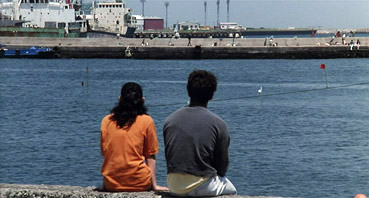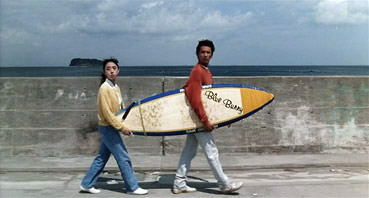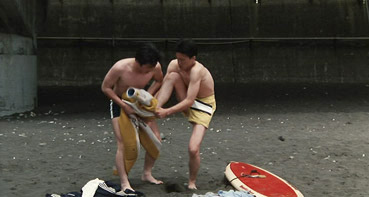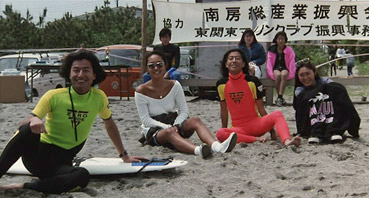|
On the release of Kitano Takeshi's delightful comedy-drama Kikujiro, a too common remark made in its critical evaluation was that it finally provided evidence that Kitano could make a non-violent, non-gangster film and do a fine job of it. Every time I saw this I wanted to phone the commentator in question and yell at them: "What about A Scene at the Sea?" But then, at the time of Kikujiro's release, precious few UK viewers seemed to have even heard of the earlier film, let alone seen it.
A Scene at the Sea, whose actual Japanese title is Ano natsu, ichiban shizukana umi (which translates literally, and a lot more poetically, as 'That Summer, the Quietest Sea') was Kitano's third film as director after Violent Cop [Sono otoko, kyôbô ni tsuki] and Boiling Point [3-4 x jûgatsu], and it remains probably the boldest film of his pre-Dolls period. Hell, by most filmmaker's standards this is still chance-taking stuff. Imagine taking this proposition to a Hollywood studio: we want to make a film whose lead characters are a deaf-mute couple who not only don't say a word (well, obviously) but they don't sign either, and there's no William Hurt stand-in to vocalise for the audience what they were saying if they did. Fabulous. Don't slam the door on your way out. But for the more adventurous viewer this should present an intriguing prospect. With much of the film playing with no dialogue at all, it's down to the body language and facial expressions of the performers, coupled with the shot choice and editing skills of the director, to tell the story. And you only need to have seen one of Kitano's other directorial works to know that this is far from a tall order.

The story revolves around introspective deaf-mute dustman Shigeru, whose discovery of a broken surfboard awakens in him a curiosity that he attempts to satisfy by repairing the board and trying his hand at surfing. His efforts prompt derisive laughter from the beach surf regulars, but the oblivious Shigeru persists in his efforts. When the board eventually breaks, he and his girlfriend Takako try to negotiate a deal on a new one, something they can ill afford but which by now has become important to Shigeru. As he continues to practice, his improving skills and his determination earn the respect of the other surfers, and he is eventually encouraged by local surf shop owner Nakajima to take part alongside them in a regional surfing competition.
If you're expecting a Japanese Big Wednesday then forget it. The surfing itself is almost background action here, and for the much of the time is shot wide from the viewpoint of observers or not shown at all, with the camera instead focusing on the reactions of spectators. Nor does the competition itself play to expectations and convention (hop to the next paragraph if you want to avoid a spoiler), with Shigeru never even getting the chance to demonstrate his improved skills because he is unable to hear his turn to compete being called.
In typical Kitano fashion, the gentle pace and tone remain consistent throughout, something made more evident than in his previous films by the complete absence of their sudden explosions of violence. There's a pictorially observational quality here that's emphasised by the scarcity of angled shots, with the camera consistently positioned parallel or perpendicular to architecture and background, and characters shot either from the side or head-on, giving some compositions the feel of animated murals. At times it's almost as if Kitano is constructing his drama from carefully composed stills rather than moving imagery, but such sequences remain resolutely cinematic in their use of sound and music, in the subtle changes in facial expression, in the movements of characters and background action, and in the waste-free scene construction and precision editing.

It's Kitano editing style in particular that feels honed to perfection here, lingering on shots just long enough for us to discover his reason for doing so and compressing action into two or three juxtaposed (and sometimes static) images in a manner that often negates the need for explanatory dialogue, resulting in a story told largely in visual terms. Such an approach would offer a challenge even for an action based film, where cause and effect storytelling would at least provide the necessary plot signposts, but for one exploring the slow development of an unemotionally expressed passion and the changing nature of a wordless relationship, it's a small miracle that it works at all, let alone that it does so in such divine fashion. Indeed, so beautifully and unobtrusively does the story unfold that you become acutely aware of how overstated most other relationship dramas feel by comparison, how heavily their plot points are hammered home, and how vigorously the buttons are pushed to prompt the required emotional response.
A connection to the director's comedy roots, and a pointer to similar character pairings in films to come, is provided by two unnamed members of a local amateur football team that we can assume Shigeru once played for (like many character details, this is subtly suggested rather than firmly established), a hapless but energetic duo who loudly mock Shigeru's initial efforts but are soon over-enthusiastically attempting to follow in his footsteps. In doing so they also become part of a cycle of surf life at the beach, inheriting the inexperienced newcomer position previously occupied by Shigeru and his immediate successor, a cocky but inept young hopeful whose girlfriend's attempts to court Shigeru's friendship fire a spark of jealousy in Takako, who is already coming second place to her boyfriend's new obsession. Later, their persistence sees them move up the community pecking order, much as Shigeru did before them, with his donation of a wetsuit to the pair (which they comically fight over, of course) repeating an earlier ritual of acceptance that was shown to him by Nakajima.
Familiar themes and situations abound, but never play out in traditional or expected fashion. Shigeru's all-encompassing obsession may lead to him neglecting both his job and his girlfriend, but the resulting conflicts have none of the overwrought histrionics of Hollywood dramas, and are settled in the same low key manner in which they arise. Similarly, there's little drama to Shigeru's competition losses and wins, reflecting his own indifference to this aspect of the sport – on the first competition entry form he dismissively puts his name down as Gorbachev, which is then corrected by the loyal and ever-patient Takako (see sound and vision details below for more on this).

A Scene at the Sea is a hugely important film in Kitano's development as a filmmaker, one in which he discards his dramatic safety net to tell a small story in resolutely minimalist fashion, and in the process scores a bold and quietly brilliant bulls-eye. There's no violence (a comic struggle between police and an irate van driver played by Kitano favourite Terajima Susumu is as near as it comes), precious little dialogue, and the tone and pacing vary little throughout, and yet the hold exerted by the characters and storytelling is considerable. The dramatic punch delivered by the final scenes is also disarmingly effective, all the more so for its partial reliance on suggestion and audience recall.
It's in this film that the director's love affair with the ocean and the seashore finds is purest cinematic expression, something that would be carried over into his next and most celebrated film, Sonatine. It also marks his first collaboration with composer and Studio Ghibli regular Hisaishi Joe, whose scores would become an essential component of the Kitano style from this point on. Indeed, much of the film's emotional clout comes from Hisaishi's music, but particularly in the way it is married to the action, heightening the emotion of sequences whose visual drama is reduced to a look, a juxtaposition of images, or the position of characters within frame. Takako's late-film second encounter with the van driver is wonderfully underplayed example of this, where the expressions and the editing tell us everything we need to know about the conversation they simply don't need to have, while the slow build of the music to a montage of memories creates a sequence that is extraordinarily moving without sinking into sentimentality.
A Scene at the Sea established beyond all question Kitano's singular skill as a cinematic storyteller, something that is too rarely associated with this particular film because it speaks in confident whispers instead of shouting its qualities in the manner of more attention-grabbing early works from any number of young filmmakers the world over. Rarely screened and too often sidelined by the director's more widely seen films, A Scene at the Sea remains to this day one of his most assured yet unassuming cinematic achievements, and unquestionably his most poetic.
The anamorphic 1.85:1 transfer here is one of the best in Second Sight's Takeshi Kitano Collection, benefiting from a solid PAL transfer from a decent source. The black levels are solid but the contrast is a little harsh at times, losing detail in shadows and darker elements, including such basics as clothing, hair and facial detail in some shots. Prime colours are nicely reproduced and skin tones appear natural, The detail is not pin-sharp, but still very reasonable.

The only soundtrack is Dolby 2.0 stereo, but it's a good one with clear separation of effects and off-screen dialogue, and has a clarity and range that particularly benefits Hisaishi's score.
Once again the English subtitles are clear and a decent translation of the original Japanese, but as with a couple of the other discs in this collection, odd moments here and not subtitled at all, usually chat between the surfers or comments made about the performance of others. While, as in Violent Cop, this only means missing out on some of the small talk, here one omission is actually damaging to our full appreciation of the Shigeru's attitude and motivation. The sequence in question is the above-mentioned form filling, where Shigeru writes Gorbachev (literally 'Gorubachofu', the nearest Japanese equivalent), in place of his own name (for any young readers with no sense of history, a quick net search will land you a couple of million hits). The document is shown in close-up so that we register this and will thus understand why Takako then sets about correcting it, but it also provides the only real indication that Shigeru is not really bothered about the competition and is surfing purely for the pleasure of doing so. This has an impact on our understanding of his actions towards the film's end, and yet there is no subtitle present to translate what he has written, leaving any audience not versed in katakana without this small but important behavioural pointer.
Nothing at all. A real shame.
A Scene at the Sea may differ from the common perception of the Kitano norm in its lack of violence, maverick cops, yakuza gangsters and even Kitano the actor, but his directorial stamp is still on every carefully composed frame and perfectly timed edit. It's a quietly exquisite film whose boldness of conception and quality and consistency of execution mark it as a confident step forward from Violent Cop and Boiling Point – both of which were excellent films in their own right – and a foundation setter for what remains one of Kitano's greatest films, Sonatine. Second Sight's DVD has no extras, but the transfer is good, despite the sometimes harsh contrast, and the film itself justifies this particular purchase.
|